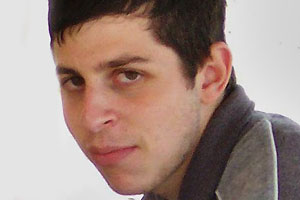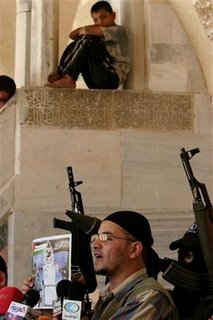 |
| Vehicles line up for security inspection at Huwwara (not yesterday) [Image Source] |
We happen to believe strongly in security arrangements. When we say "human rights", we actually mean to be thinking, first and foremost, about the human right to stay alive. It's a right that was denied our daughter Malki, murdered in a Hamas attack when she was fifteen, and a right the breach of which aroused, in simple terms, terribly little outrage by the human rights industry.
Yesterday (Sunday), a balmy summer day when much of the country was vacationing, provided several insights into how security works and who benefits. This is true not because yesterday was a special day but because it actually was not. And what's striking is that for all the arguing that security barriers are pointless, worthless, useless, ineffective because terrorists can easily avoid them, and a torture for those forced to endure them, the uncomfortable fact remains: those are exactly where malevolent people with weapons of death on their bodies or in their bags or cars keep turning up and keep getting caught.
- At the IDF security checkpoint at Huwwara, south of Shechem (Nablus), an Arab male driving a vehicle stopped shortly before reaching the soldiers manning the barrier, got out of his car and came running at them with his knife brandished. The soldiers acting on orders opened fire in the face of a hostile action with clearly-articulated intentions, and the attack ended. The assailant, according to the Palestinian Health Ministry, quoted by Israel National News, is a 31 year old resident of Shechem. Ma'an News Agency gives his name as Rami Muhammad Zaim Awartani. The circumstances suggest he was intent on launching the sort of interaction for which knives are needed, and not - as is frequently claimed - en route to some other peaceful purpose when assailed by hostile IDF personnel. The attacker is now dead - assassinated, in the words of parts of the English-language Palestinian Arab media [click].
- Also on Sunday, a little later in the day, Israeli police stopped a Palestinian Arab taxi cab at the busy Tapuah intersection in the Samaria district. Such searches are common and routine, and often triggered by suspicions stemming from indicators for which the security people are trained to identify. In this case, their search turned up parts of M16-type weapons in the cab. The driver is now helping the authorities with their enquiries. He is unharmed.
- Then last night (Sunday) at the Trans-Samaria Crossing, a vehicle driven by an Israeli Arab with Israeli citizenship papers was stopped and in the course of a search was found to have four pipe bombs on board. The driver was heading back across the Green Line from the communities of Judea and Samaria. A police sapper was called to the scene to neutralize the bombs. While that was underway, the very heavily-traveled east-west Route 5 highway was temporarily shut down to traffic in both directions. The driver turns out to be a resident of the Bedouin city of Rahat in the Negev. He is now arrested and he too is helping the authorities in their enquiries.
 |
| The Trans-Samaria Crossing on Israel's east-west Route 5 [Image Source] |
It's safe to assume that in the absence of the security arrangements in each of the locations we just described, very different outcomes would have eventuated.
That's a reality that has played a central role in the posts we wrote over the years. Take a look at "5-Jul-06: Preventive Measures... Work" from more than a decade ago. We noted there that
There are many aspects of the news coverage of this war that infuriate us. One of them is the dishonest and cowardly way some reporters and photographers distort how the Israeli authorities carry out preventive security. Among the favorite cliches of agenda-driven reporters and photographers... is the Israeli security check. Nothing captures quite so well their perception of an asymmetrical war. You can count on words like "forced to stand in the heat", "treated rudely by Israeli troops", "seething anger", "humiliation" and "demeaning" sprouting from each sentence. But never the unbearable truth that this is the strategy of last resort and it saves lives on both sides...
For those of us not infected by the Fiskean approach to this war, the role of active, preventive security is probably better appreciated. A classic of the genre is Robert Fisk's memorable article with the unmemorable title "How Pointless Checkpoints Humiliate the Lions of Palestine, Sending Them on the Road to Vengeance" [reviewed here - we are still hunting for an online version of the Fisk piece]. If you click the link to read it, please keep in mind it was written several weeks before the murder by Hamas terrorists of our fifteen year-old daughter. Ponder also on the fact that Malki's killer hid his explosives inside a guitar case on his back. Under current Israeli security procedures (but not at that time), he would have been stopped and our daughter would be twenty and alive. (The death toll that day was 15, plus 130 injured, plus a young mother left unconscious and still unconscious today.)
The appalling Fisk, and perhaps also his editors at Britain's Independent newspaper, would find it hard to see what that has to do with him and his writing. But for us the connection is clear.
 |
| Eliyahu Asheri Hy"d: Murdered a decade ago |
Incidentally, if you visit Tapuah Junction (mentioned above), you will find a brand-new rest facility there for travelers. It was inaugurated very recently by the Asheri family in honor of their son, Eliyahu Hy"d, to mark ten years since he was abducted and murdered by Palestinian Arab terrorists.
We wrote about them at the time of their terrible loss: see "29-Jun-06: The face of the enemy" and "4-Jul-06: Saving Hostages".
Though we felt drawn to the tragedy of their son's death and took part in his funeral in Jerusalem all those years ago, we don't know the Asheris and have never met them. Still, we're confident they have not spent the past decade plotting revenge, stewing in their anger or incubating hatred. We are confident of that because of our close familiarity with that powerful urge in Jewish tradition to connect really bad events - personal and communal tragedies - to positive responses: acts of charity or of chesed - acts that bring a little more goodness into a world that needs as much as we can possibly provide.
The Asheris understand that. Mr Fisk and his editors, we assume, surely do not. And nor will the families of the violence-minded individuals in yesterday's three jihadist near-misses.
We wrote about them at the time of their terrible loss: see "29-Jun-06: The face of the enemy" and "4-Jul-06: Saving Hostages".
Though we felt drawn to the tragedy of their son's death and took part in his funeral in Jerusalem all those years ago, we don't know the Asheris and have never met them. Still, we're confident they have not spent the past decade plotting revenge, stewing in their anger or incubating hatred. We are confident of that because of our close familiarity with that powerful urge in Jewish tradition to connect really bad events - personal and communal tragedies - to positive responses: acts of charity or of chesed - acts that bring a little more goodness into a world that needs as much as we can possibly provide.
The Asheris understand that. Mr Fisk and his editors, we assume, surely do not. And nor will the families of the violence-minded individuals in yesterday's three jihadist near-misses.


